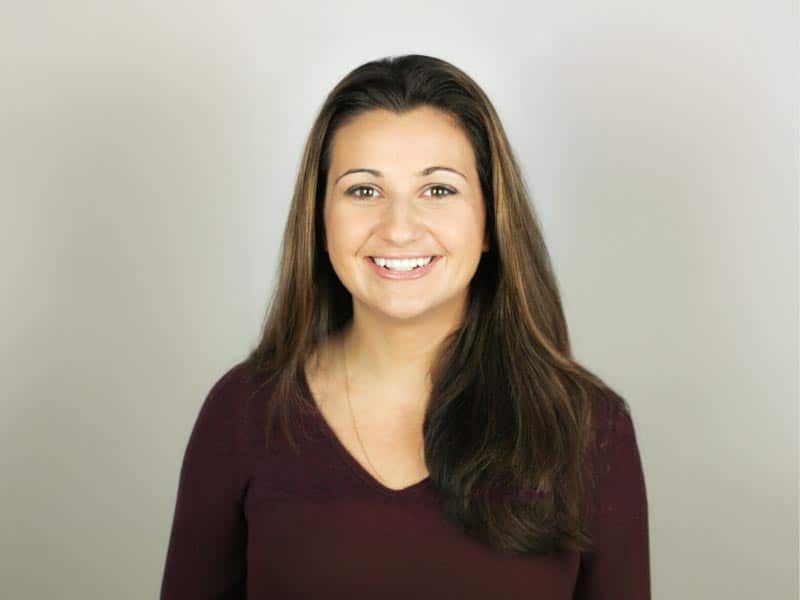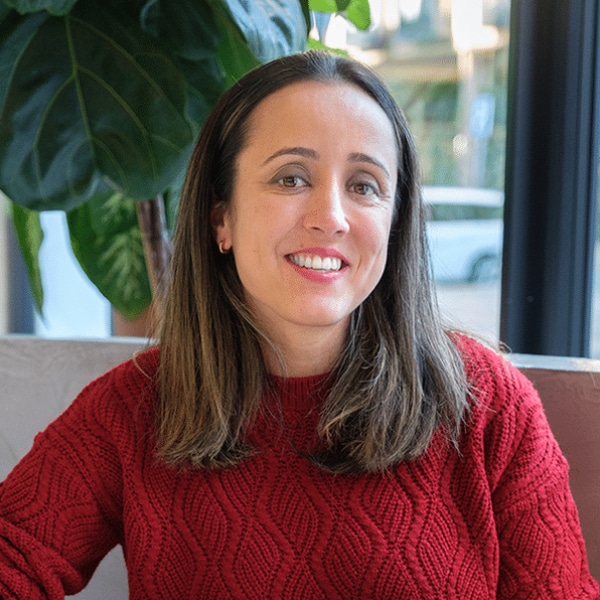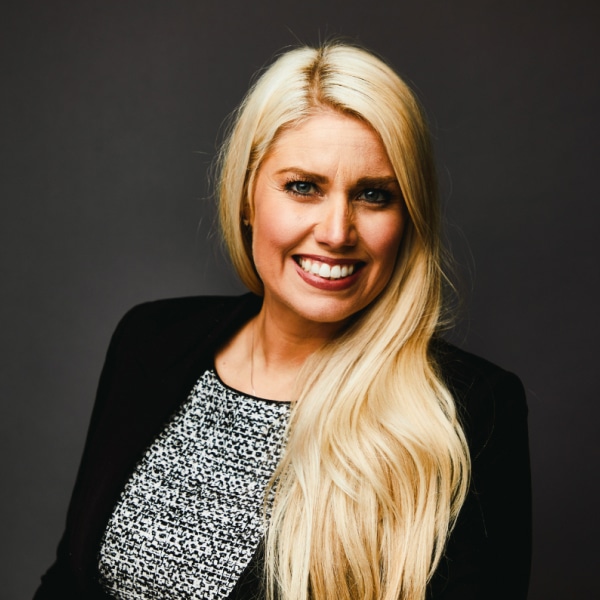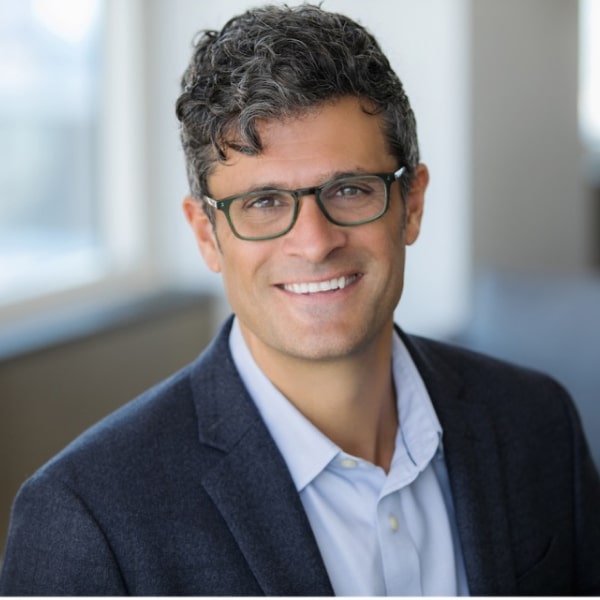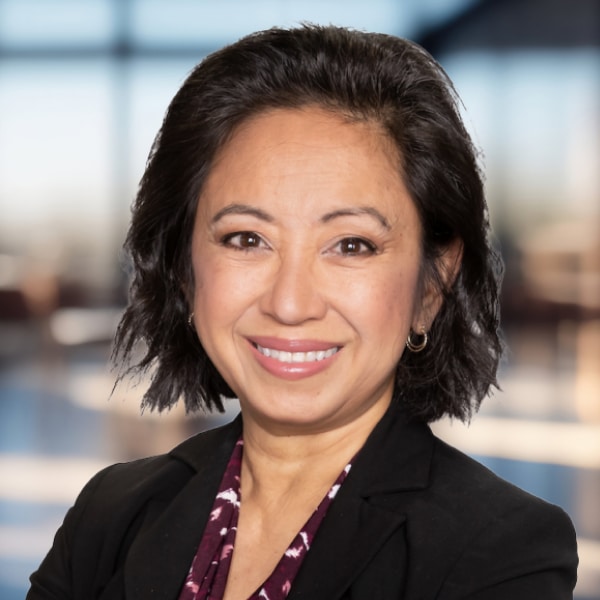Driving AI Transformation In Marketing In 2025
Eric J. Bertrand
CEO at Mod Op
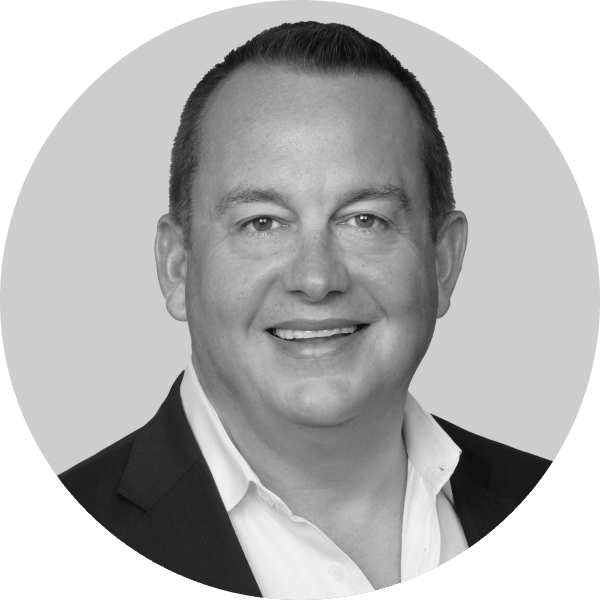
Curious about how AI will shape the future of marketing? In this milestone 100th episode of the Leader Generation podcast, Eric Bertrand and Tessa Burg take a look at what’s next for AI-driven marketing.
“We’ve started to use AI to elevate our expertise, work more efficiently, and ultimately, measure success based on the growth that the client experiences from those outputs.”
Eric shares his vision for harnessing AI to boost efficiency, elevate creativity and deliver real value to clients. From streamlining repetitive tasks to using data for smarter decision-making, Eric talks about how marketers can adapt to rapidly changing technology.
“It’s not enough to just pull tech into your business. It’s about creating a transformation program that starts with your data.”
Whether you’re considering AI adoption or already working on it, Eric shares ideas on how to maximize ROI and add AI into existing workflows. His outlook on the role of data, client-focused innovation and self-governance is great for marketers looking to drive AI transformation.
Highlights:
- The role of AI in automating repetitive tasks
- Leveraging data for full-funnel marketing insights
- Importance of governance and compliance in AI
- Strategies for maximizing ROI with AI
- How to drive innovation through client-focused AI
Watch the Live Recording
Tessa Burg: Hello, and welcome to another episode of “Leader Generation,” brought to you by Mod Op. I’m your host, Tessa Burg, and today I am excited to welcome Eric Bertrand, our CEO here at Mod Op. Eric has led Mod Op as the CEO for the last seven years, including the last three where we at Mod Op have experienced tremendous growth, over 300%. He was recently awarded the CEO Forum Group’s prestigious Transformative CEO Award in Leadership in the category of digital transformation. He was also named as a finalist for the Agency Executive of the Year by Digiday, and he co-authored the book “Getting Digital Done” with two other Mod Opers, Len Gilbert and Jonathan Murray. Eric, we are so excited to finally have you on the podcast. Thanks for joining us today.
Eric Bertrand: Yeah, thanks for having me. I appreciate it. It’s been a while that we’ve been putting something together, and I think this is a great time to do it.
Tessa Burg: I agree and this time of year is when a lot of marketers, a lot of our clients are asking, “What should I be thinking about? “What should I be planning for as we head into 2025?” We know from talking to our clients, a lot of them have finalized budgets, and they’re really, I think, with AI moving so fast, questioning if they’ve made the right bet. So today we’re gonna dive into driving AI transformation in marketing in 2025. But before we start, tell us a little bit more about yourself and your background.
Eric Bertrand: So, I appreciate you going through the, this has been a great year for us, and it’s great to get some accolades from some of the industry press, but really it’s about the team. It’s about the team that we put together and the company that we’ve been building, which, of course, you’re a big part of. And I think that it’s an exciting time because we’ve been working really hard and trying to put together, you know, kind of putting a lot of programs together that are coming to fruition as we speak. In addition to that, you know, it’s really exciting to be on, as we talked about, be on the podcast. This is the 100th episode of the podcast, which is amazing. I mean, it’s amazing that you’ve been able to put together this forum, and really have a leadership voice in marketing and marketing technology and innovation for 100 episodes. So that’s an amazing journey that you’ve been through and it’s an amazing accomplishment. So I applaud you for that.
Tessa Burg: Thank you.
Eric Bertrand: Yeah, it’s exciting for Mod Op to be part of that and for us continue on this journey that we’ve been on. So, just to, sorry to hijack the conversation a little bit, but it was important. I really wanted to get that out, because it’s an exciting time.
Tessa Burg: It is exciting. I mean, when we started this podcast back in the pandemic, I had no idea how much I would learn, how many people we would meet, how the network would grow, and really inertiate us even more into our client community. And I love the feedback. So it’s exciting that it’s the 100th episode, and I’m looking forward to, you know, what topics and what conversations we’ll have next. And I’m excited to have more clients on. We have a few more lined up, but I’ve learned so much from the amazing thought leaders that we get to work with every day. So it’s been an incredible journey.
Eric Bertrand: Yeah, the guests you’ve had have been amazing. We’ve had some really, we have had some amazing clients on, even last week with the CEO of GumGum, and you know, folks from all different, some of our clients over the years, it’s been really a great, it’s been a great experience.
Tessa Burg: So, I am so impressed with our growth. It’s been amazing to, as we’ve been on this journey, acquire agencies that fit us, not just from a services and expertise standpoint, but also culturally and share in the vision of Mod Op. Can you give us a little bit about, you know, what is driving that growth strategy and where are you hoping Mod Op lands as we continue down the road of looking for these really powerful, really niche marketing expertise firms?
Eric Bertrand: So about five years ago, maybe six years ago, we felt that there was really a benefit in having a full service agency. So the clients that we were working with, a lot of them would ask us if we could do certain things, and we really didn’t have the expertise, and we really didn’t wanna be the kind of group that would say, “Oh, sure, we’ll do whatever, “but we don’t really have the expertise to handle it.” And so it really was a concerted effort to acquire companies that had various expertise in the marketing spectrum. And so we started that a while ago by acquiring a group out in Dallas called MC Communications that had been in business for about 30 years. And that was a real first acquisition that we completed. And it really added some great expertise in B2B and digital media and digital marketing. And so when we integrated, and integrating companies is not easy. It is quite difficult, especially in a service business where you have people. It’s a people business, and that integration can be difficult. It takes time and energy, and it takes a while to hone the strategy, and to get it down to a process, and make sure that you’re, you know, doing all the things you need to do to make sure it goes well. And I think we’ve had a great experience there, we’ve learned a lot. But I think that the full service model is a model that we really believe in, that we feel that clients are looking for more services from one company, especially as technology is advancing and innovation is advancing, and many of these different aspects of marketing are coming together. And so I was actually speaking to a Gartner analyst yesterday about this subject, and he was mentioning that this is a trend, right? This is a trend now, I think we were probably early on in the trend cycle, but that there is a trend for clients to focus on agencies that have multiple services. I think it provides a more seamless experience for the clients. I think it provides ROI in a better, much higher ROI than working with standalone groups because you have the synergy of being able to work together as a team. You understand the entire client business, like what their goals are and what they’re trying to achieve, and you’re partnering with them to do that. You’re also not trying to provide services that are not good for them, right? So some companies, if they only are very specific around one service offering, of course, they’re gonna focus on that service offering, but it may not be the best for the client. And so you really wanna stick to what is the best for the client, and how do you drive their ROI, and make sure that their business goals are being achieved.
Tessa Burg: Yeah, and one thing I love from the AI transformation standpoint is one of the benefits of AI is automation and efficiency. And what we always say in our innovation team is, “You can’t automate what you can’t measure.” Meaning, if you can’t document the process today and connect the dots and think through that, then you, automation just doesn’t come from anywhere. And as we’ve acquired agencies, we’ve moved them to our shared platforms so that we can start to connect those dots. And marketers who are just now getting into testing AI apps, they’re experiencing those benefits of shortening down cycles, going from doing something that’s 35 steps to three steps. And we’re able to start doing that across many different services and to measure the impact of not just what is PR and isolation, but what is PR when paired across the entire journey. So that really excites me that when you started this journey, it was about just making sure that we provide the highest quality services and we don’t BS our way on what we have and what we can do. And now it’s turning into, well, if you want one place to go, and we’re starting this innovation and connecting those, using technology and AI, you’re going to get, you’re gonna be able to see patterns that you haven’t seen, learn more about your end customers, get predictive analytics and be able to measure full funnel, which I feel has always been the dream. But, you know, AI is making a lot more possible now. So tell us about, in the last year, you know, we were growing through acquisition. How has sort of this rush or advent of AI changed or added to your vision for overall Mod Op?
Eric Bertrand: Well, I think to your point, I think that where AI is going to add significant value to us is automating repetitive tasks. And we call it art, you know, mod art. We actually have coined it. So we’re looking at tasks that are somewhat mundane, fairly repetitive, and frankly, those don’t add a ton of value, to be honest. And they’re not things that employees really love to work on because they are fairly mundane and repetitive. And so I think that what we are focused around is in, first of all, internally, how do we automate some of those tasks using AI? How do we bring the team members really to work more strategically and do the things that really add the value, again, to the clients? I mean, it’s that value whether you’re pulling together a report that you have to do every week for digital media that is really just a repetitive mundane task. But now instead of spending that three hours pulling that report together, you’re able to now focus more around the strategy, what new opportunities there might be for the client, how do we drive efficient, you know, efficiency around other things that we’re doing? How do we drive better ROI? So I think it’s really a way to elevate some of the tasks that are being, you know, being handled today to be more strategic and more creative. And I think that’s where we’re gonna find the most advanced advantages as an internal organization to drive value using AI to start with.
Tessa Burg: I love the examples you gave with the KPIs that relate directly back to what our clients care about. And that’s, you know, one of the big themes in the book “Getting Digital Done” is instead of looking at your own internal priorities is to look at what your clients care about. And we get that question all the time. What is the ROI? If I put this much in, what am I gonna get out? And marketers are experts at efficiency, trying to squeeze out, get more value for every dollar. So in, when Mod Op is moving towards ART, automation of repetitive tasks, it’s not just for us, but it is to continuously deliver higher returns for our customers and find ways to bring them closer to their customers and clients.
Eric Bertrand: Yep, 100%.
Tessa Burg: So let’s talk a little bit about “Getting Digital Done.” We released it in Q4 and this book has been in progress for I wanna say a little over a year. Like it really, it wasn’t just slapped together. It was a big collaboration, lots of rounds of changes. So why is it important that it was released right now?
Eric Bertrand: Well, I think that, you know, we had, one of the companies we had acquired about a year and a half ago was a company called Deep Prism, which is really a consultancy focused around digital transformation data and AI consulting. And it was an interesting acquisition for us because it wasn’t a typical agency, it wasn’t a typical marketing agency. So although we’ve acquired 10 companies or so in the last several years, this was a little bit different. And we really wanted to acquire Deep Prism based on their expertise, based on what they, how they work with clients, what they’re able to provide to clients. And we felt that, especially in the marketing world where you need to have a mindset of transformation and especially with data. Right now, data is massively important with the way AI is being rolled out. And so it’s super important for companies to have that strategy in place and to bring in folks that can help them put these data strategies together and make sure that they’re really focused around digital transformation, have a program in place, have governance and compliance in mind when they’re doing some of these things. But it’s in, even in the book, we talked a little bit about, you know, digital as a mindset. It’s not a way, it’s a way of being, it’s not just a piece of equipment. It’s not just something you can buy off the shelf and just implement in your organization and turn the button on. It has to be a mindset and has to be a change, a change management process within your organization. And that was really the reasoning behind the book. And I think we’ve tried to go through a lot of cases around why that’s important and how you, you know, kind of the more inner workings in an organization of how it works and how you roll it out.
Tessa Burg: Yeah, what struck me most about the book is we’re using the word digital in “Getting Digital Done” and right now there’s just, there is a lot of hype. There’s also a lot of reality around what AI could potentially do to the workforce, to marketers, specifically. We hear a lot of stats. One from the Marketing AI Institute was that, you know, 99% of marketers are already using AI, but we only see 13% of businesses have been able to measure the impact. And that is because a lot of businesses have not figured out what that transformation program needs to look like. And it goes beyond, as you said, just pulling tech into your business. Yes, there’s been tons of benefits, we all are using apps. We’re loving ChatGPT, maybe you use another app that helps you with editing or writing is, you know, writing’s been very disruptive. But without a true transformation program that starts with your data and understanding the relationships among your data and what it can do as far as be the fuel for transformation, you’ll be stuck for a very long time in just testing and using apps on an individual basis. But you won’t be able to measure the true impact of that on your business and especially won’t be able to line it back to your vision or monetary goals. So I highly recommend that people like take a read of the book ’cause it puts it in context as to why it’s so important.
Eric Bertrand: Yeah, I think that we, and I had read a, I think it was Microsoft had published one of their annual reports that talked about 70% of employees are using AI in some form or fashion for work, but only about 20% to 25% have actually been approved either by their.
Tessa Burg: Oh, yeah. So it’s out there and people are using it and I think the goal is to now harness that in to make sure that it is being used properly. That again, we do talk a little bit about governance and compliance, making sure that it’s, there’s a program in place, you know, and frankly we went through that journey, right? So I mean I, you know, it’s great to kind of have the strategy for some of this stuff, but the actual implementation of it is very, very important. And I think, you know, I had tasked you with developing an AI council and driving that. I think we were one of the, to be frank, I think we were one of the first agencies that really developed that process and had it out there. This was back very early on and we had talked about it even before the major announcements around, you know, Open AI and ChatGPT. But maybe, I’d love to have you talk a little bit about, you know, just the thoughts about our digital transformation journey and some of the things that we had done from the, you know, AI Council and some of that would be would great to hear.
Eric Bertrand: Yeah, I mean, you’re right. We started with governance and compliance and the first thing we did after ChatGPT launched and became more popular was to release a responsible use policy. And we, as an agency across several divisions, had already been using AI as a part of our work, but we really only emphasized security and compliance with the people using the apps because, you know, as you know, not a lot of people actually love to take compliance and governance training, so they don’t really wanna talk about it. It’s not that exciting to them. But once ChatGPT came out, it was clear that everyone was gonna be using this. And so we really focused on making sure that employees understood the risks, the risk of using the tool and how it was trained and what’s important to understand about bias, quality, and hallucinations. And also paying strict attention to what data’s going in and how does that impact data going out? And we did some fun activities to make governance and compliance be more accessible. We did a promptathon so that we started to maximize our expertise. We have expertise in so many different areas and how does that translate into prompts that can truly add value to our different divisions and our different roles? But I think one of the most important things that the AI Council did was bring people together from those diverse divisions with diverse perspectives to really, I guess, shoot holes in what was responsible use. There, we can say a lot of words that we think we know the meaning of, but when you hear it from different perspectives that it’s a lot of gray area. But we were able to align on it based on shared values and a clear vision. And that vision being we are in service for the clients. And so when we look at this, are we looking at it from what is gonna serve our clients well? How do we best protect their brands, their data? And that’s what we continue to go back to, even though now we do truly use AI across the entire company, but it’s always in the spirit of higher quality, making sure we have the controls in place for accuracy. And it’s led to even more testing, which I think was a little counterintuitive. When we first released it, it’s like, oh, they’re saying no to everything. We actually have never said no to anything. We just put in the right guardrails so that people can continue to experiment and learn at a more rapid pace, but in a safe and responsible way.
Tessa Burg: I think that’s super important. I think that’s what you tend to find is that when new technologies are rolled out, people tend to wanna jump forward and start using ’em immediately without really understanding if there might be repercussions from a business perspective or, you know, that they could be doing something that could be jeopardizing, as an example in our case, clients, which would be, you know, terrible. So we really, I think that’s a super important aspect of how it rolled out from our AI Council and just the way that we’ve come at the challenge. And from the AI Council really spun out a bunch of different things, including an innovation program and progress that we’ve moved forward on. Maybe, I’d love to have you also talk a little bit about that, because I think that’s a super important aspect of what we are part of at Mod Op these days.
Eric Bertrand: Yeah and I think when you set up a culture of innovation, and innovation just starting with testing and trying and then looking at, okay, where are we having some wins and then where are there some gaps and opportunities to solve client problems, simply better. Either more efficiently or in a way that’s highly personalized to that client. And what we found is just like employees want their trainings to be specific to them because it’s easier to understand, they can evolve their role more efficiently, they are more secure. They act in a more responsible manner the more relevant it is to them. That’s exactly how clients operate. If innovation is more specific to their brands, their standards, what their goals are, then they’re more likely to adapt it, more likely to be able to use the services more effectively. So our innovation has really focused on creating agents, automated processes that we can easily make highly specific to each client. And where we’re starting is using the technology to do our work better. So elevate our expertise, make our work more efficient, and ultimately measure the success based on the growth that the client experiences from those outputs. And I think that’s a, you know, in “Getting Digital Done,” this really is a very good recipe even for clients to do is when you’re trying to think about where you should be using AI in your business, first start with your own business and see like what have you always wished you could do? What do you wish you could be getting from this team? And look at your data, you already, a lot of clients already have a ton of fuel in-house, but they don’t know how to extract the right value from that fuel to accomplish the things they’ve always wished doing. And for us to be able to do that for our clients, we’ve started to do that for ourselves.
Tessa Burg: Yeah, we’re, I mean the book, I think the book is just a, it is probably one of the first steps. We’ll probably do others and maybe some additional things. We’re pretty excited about the publication. We actually published the book a couple weeks ago and we’re already number two in the Amazon bestseller for organizational change books, which we think is.
Eric Bertrand: Oh, my gosh. We’re at number five in information management books and number nine on the Kindle store for information management as well. So it’s kind of getting, we’re actually excited about the fact it’s getting a little bit of, folks are actually reading and looking at it and hopefully taking some of the lessons out of it and starting down that digital transformation journey.
Tessa Burg: Yeah, I mean it is so timely, so relevant for right now. And while we’ve had an awesome year and we’re so excited to start taking some of our innovations and making them client-facing and allowing our clients to test, experiment, and scale with us, there are gonna be some challenges. So when you look at 2025, what do you think? What challenges do you foresee for marketers, in general, and, you know, for our clients and our clients’ industries?
Eric Bertrand: Yeah, I think, well, of course, there’s the macroeconomic, you know, trends and things that are obviously changing, that are having impacts on various industries that we support and focus on. I think from a marketing, and which adds obviously implications on marketing, right? So if budgets are being decreased because of pressures there, then it will have impact and often has. That’s one of the first things that has impact is their marketing budgets. So I think that hopefully we have, we’re gonna come a little bit out of that economic down, kind of slowness that was in ’24. Hopefully ’25, is looking a little bit better, especially with some of the stimulus that’s happening with interest rate reductions. So, I think that the technology will be a big part of ’25, right? How AI is being rolled out, the impacts that will have on the various programs that we drive and we roll out. I think the efficiencies will get better. Therefore, I think the ROI will go up for a lot of marketing initiatives that folks are employing. Even the data side, right? The data side is so important, as we’ve talked about. And being able to take disparate data sources and create a one source of truth for data and then use that to implement some of these programs. We’ve talked to a number of B2B clients that have many sources of data and they don’t have any way to access all that data. And one of the things we’re working on with them is how do you aggregate that data, get one source of truth, and then be able to roll out programs that will focus around how do they drive their business and grow their clients? How do they push more revenue through the client base that they currently have, et cetera. So I think that’s what ’25 is gonna be about is rolling out kind of efficiency. It’s gonna be a lot about data. I think data is gonna be the big word in ’25.
Tessa Burg: Yeah, I agree. I mean there is such a big chasm right now from using AI to actually measuring ROI and I’m excited to continue to get that question from our clients. Like, if I put this much in, what’s my ROI? There’s no way to guarantee ROI, but with the frameworks we’ve put in place, we can now leverage AI to optimize towards it. And I love that. So we don’t have to launch a campaign and be like, “Oh man, I hope this gets a return,” or “I hope this performs like we thought it would.” It’s, you can leverage AI built into a lot of the core tech that we’re already using. And again, this is gonna take training and upskilling. So I think data is a big thing, learning how to get your data. I also think companies are gonna have to invest in how do you go from just general AI training and general conversations about it to actual change programs that help you upskill, reskill, and evolve roles to get more out of the tech. And when you do that, then you’ll get the benefits of being able to achieve ROI in every campaign because the models are predictive and there’s a confidence level associated to it. So I am really excited to see those three things come to fruition is get your arms around your data, and be conscious that not only is your CEO and your CTO and the compliance folks concerned about security, but so are consumers. So I think a lot of companies are gonna have to start having more transparent communication with consumers and clients about how they’re getting their arms around their data, how are they using it and securing it? And as you move into training and reskilling, now you’re teaching people how to use this tech in the right way and you’re building confidence with an audience while evolving your workforce. And then the last piece is that measurement piece. And I feel like marketers, the data’s being taken away from us more and more. Like, you know, Google Analytics, Google, they’re all, when the cookies go away, like it’s getting harder and harder for us to actually see what’s happening, but that’s what makes making the most use of the data you already have so important and continuing to use platforms to optimize towards specific goals and having the right skills to do so. Absolutely critical going into 2025.
Eric Bertrand: I agree, I agree.
Tessa Burg: So, let’s talk about something, that’s exciting. Those will be some challenges, but what are, is there anything else that you’re most looking forward to next year in addition to our client symposium? That’ll be fun.
Eric Bertrand: That one, that’s pretty exciting. We’re looking forward to pulling that together. You know, I think we’ve really as a company, we’ve been able to expand, to your point earlier, quite a bit. We’ve been on a aggressive acquisition and I think, and as I mentioned earlier, we really have started to hone the process and hone the kind of companies that we’re really focused on seeing and integrating into Mod Op. So I think we’re gonna continue that. I think we’ll be continuing acquisitions, we’ll look for certain companies in very specific expertise areas to integrate, make sure that we have that full offering. We’ve added a bunch of new clients this year, organically, as well. It’s not just through acquisition. We’ve actually, I think we’ve added about 10 Fortune 500 clients in the past, this year in ’24. So we’re super excited about now what we can and all the themes that we’ve talked about today are themes we’re working with some, you know, working with these clients on, which is amazing. So we’re really excited about those new opportunities. We obviously have a great bunch of clients that we worked with for very long periods of time and we’re excited to roll out some of these programs with them as well. So I think it’s gonna be very exciting year. I think we’re going to have a lot going on between the organic growth that we’ve had and some of the new acquisitions, the future acquisitions we’ll be looking at. So, it’ll be an exciting year.
Tessa Burg: Yeah, I’m excited, too. And I have never worked at a company that had their own client conference, but I feel like as AI and automation and people working hybrid and remote continues to be the norm, bringing people physically together is so important. And I will say that’s what I’m most excited about. I want to get more feedback on the innovation we’re building. It’s gonna be awesome to see people use some of the tools in person just to get that reaction as opposed to always being on the phone or just seeing the data ’cause context is everything. You know, like it’s, sometimes you can look at the data and you can see what people literally did, but when you hear the way it made them feel, when you hear the conversations and different viewpoints. And we’re gonna have some incredible speakers, not only just our clients, but some leading CMOs come to the event to share their insights, predictions, and learnings. So it’s gonna, I’m super excited and plus it’s going to be in Florida where the weather’s much warmer than Cleveland, so that will, it’ll be a good time to get away in March and to just better weather. But we are about at time. This is our 100th episode. So thank you, Eric, for being our guest today. It was awesome to hear a little bit more about Mod Op’s journey, where we’ve been and where we’re going in 2025 and beyond. And if people want to learn more from you or reach out or have questions, what’s the best way to find you?
Eric Bertrand: Just email me. It’s really easy. It’s just [email protected]. Super, super easy.
Tessa Burg: Perfect. And if you haven’t heard of “Getting Digital Done,” definitely check it out. You can find ways to get the book on Amazon or you can just visit our website. You’ll, you can also learn more about our Mod Op strategic consulting unit that helped co-author the book. And for all the episodes of “Leader Generation” there are at modop.com. Until next time, thanks Eric. And, I mean, we talk every day, so I will talk to you again soon.
Eric Bertrand: Talking to you later today. But thank you, thank you for having me, and congrats on the 100th episode.
Tessa Burg: Thank you.
Eric J. Bertrand
CEO at Mod Op

Eric Bertrand is the CEO of Mod Op, with experience in operating and managing start-ups, growth-stage businesses and publicly traded companies. Prior to Mod Op, Eric was a venture capital fund manager, where he invested $400 million in 60+ companies for over 25 years. He has served on over 30 boards, including several non-profit organizations, and brings industry expertise in media and entertainment, retail, consumer products, business services and information technology. Get in touch with Eric at [email protected] or follow him on LinkedIn.
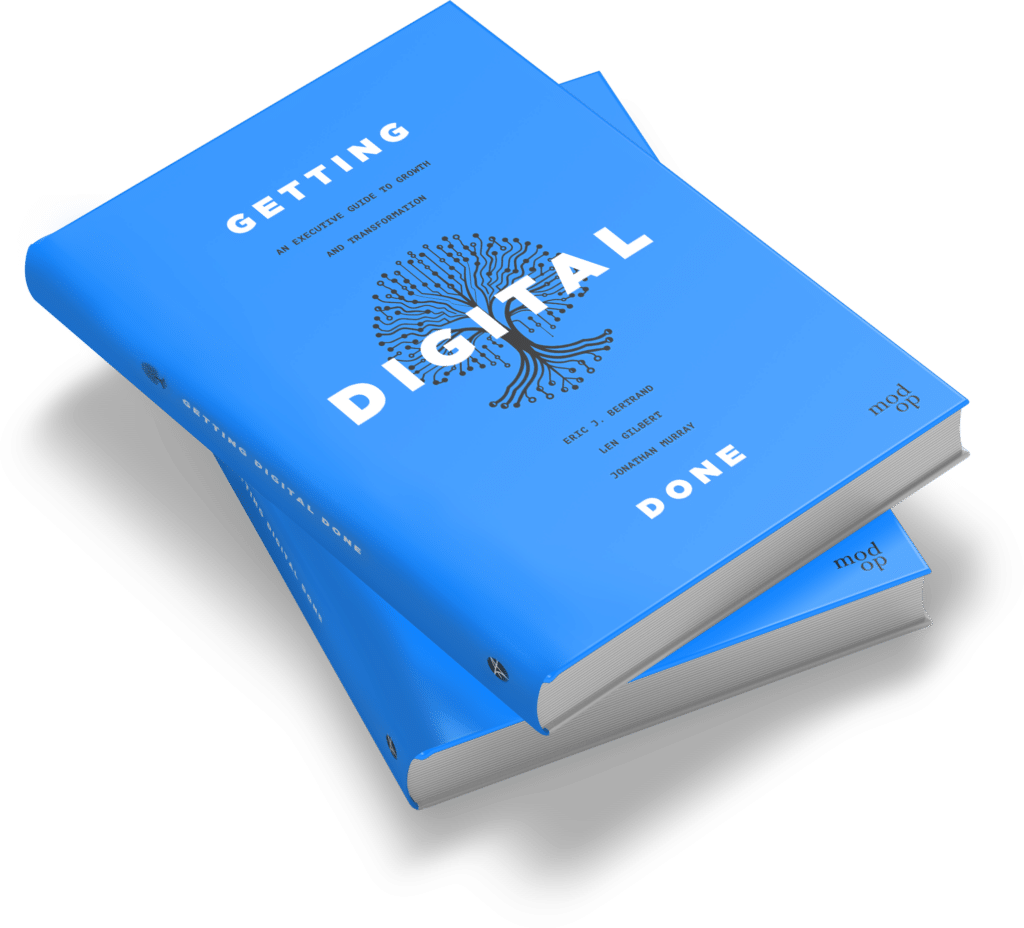
Getting Digital Done
For an executive guide to growth and transformation, check out our book Getting Digital Done.
Download on Amazon